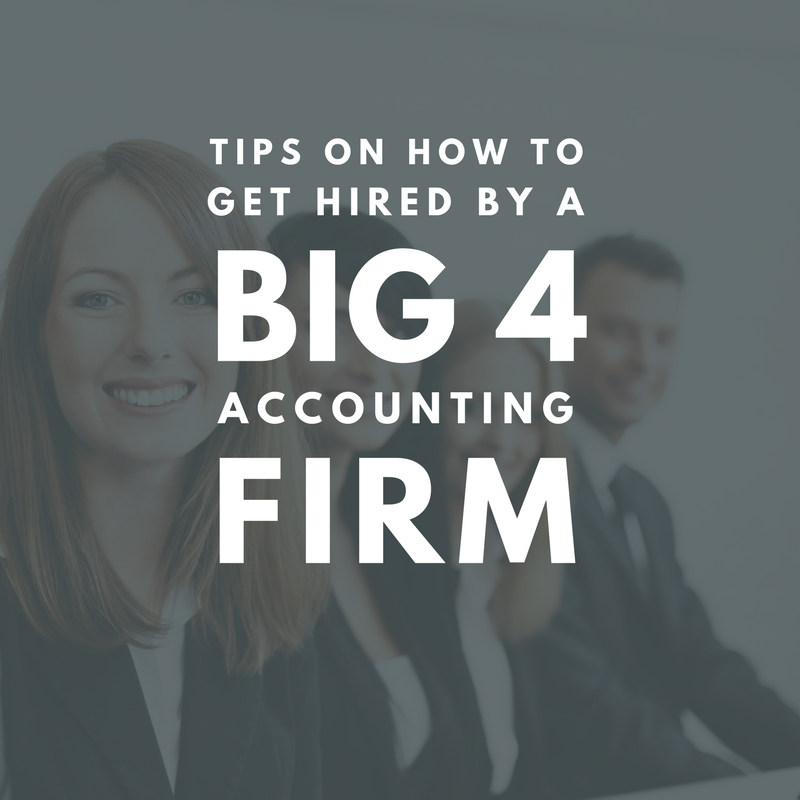For many aspiring CPAs, being able to work for the Big 4 is a huge honor and accomplishment. Not only do they perform a majority of the world’s auditing services, but they are also voted some of the best employers to work for. This goes without saying that getting hired by the Big 4 isn’t easy; however, there are certain steps and processes you can take in order to get your foot one step closer into one of their 4 doors.
1. Fall Recruiting
This is the most important time of the year for Big 4 firms who invest millions of dollars into this two-month period (September & October). They are mainly focused on filling internships for the next year and full-time positions. The focus is more on the summer leadership conferences in the spring semester.
In order to get in touch with firms this fall, the first option for any student is to join Beta Alpha Psi or another accounting society and go to the career fair. The meetings your organization hold will often have firm speakers with whom you can meet and request business cards right after the meeting. The career fair is also the best time for meeting the firms in mass.
2. Pass the CPA Exam as Soon as Possible
Many of the Big 4 firms do not expect their newly hired recent college graduates to already have their CPA license. They will definitely offer incentives and encouragement for them to obtain their CPA, but that’s a bit further down the road.
So here’s how you can really stand out and have an edge against others in your class:
Take and pass the CPA Exam the summer after you graduate or even sooner. It will be a great advantage. Tweet this
It’s something the Big 4 recruiters don’t see often, and if you can present yourself with those passing scores during career fairs or fall recruiting, you’ll have a much better chance of being noticed and highly regarded right off the bat.
3. Prepare These 3 Documents
There are three things you must have to even be considered by one of these firms: your resume, cover letter, and good email templates. Most people are surprised to learn that 90% of the value of these documents is in how they are formatted and presented. It is more important to have the right formatting than it is to have 100% perfect grammar, spelling, or a high GPA.
4. Make a List of 20 Firms/Companies and Commit to Meet Them All
In the city you want to live in, make a list of at least 20 firms or companies where you would want to work and commit yourself to meeting them all if they show up at special events on campus or at your career fair.
Meeting the recruiters and HR team at these companies is extremely important since it will give you a chance to get to know more about them. You can find out more about their company culture, benefits, and what they’re looking for in their employees.
On the opposite end, they will also get to know more about you and what you’re looking for; always remember that finding out whether or not employer and employee are a good fit goes both ways. You’ll be able to narrow down the companies/firms that you’re really interested in and continue to hone in your efforts accordingly.
5. What if the Firms/Companies Aren’t on Campus or the Career Fair?
Not a problem at all! This means you have an advantage. Very few people apply to companies that don’t show up on campus or in your accounting organizations, which means less competition. Find their contact information and do the following:
- If you’re using Gmail, download Yesware to track email opens, clicks, and attachment opening
- Send a nicely formatted email noting that you will call them on X date
- Attach your resume and cover letter as separate PDF’s
- Call them on the date promised and if they don’t answer, send a follow up email
- Then follow up 3 business days later
- Then again 7 business days later
- Then again 14 business days later
- Then again 28 business days later
- Then stop
Although this tactic may seem a tad bit pushy, it actually is not viewed by most companies that way. There are a number of reasons why they do not respond quickly, and sending multiple follow ups ensures that you’re interested and ambitious–which can only work in your favor.
We hope you found these tips to be helpful and wish you the best of luck on landing a job at the Big 4 in the near future!
